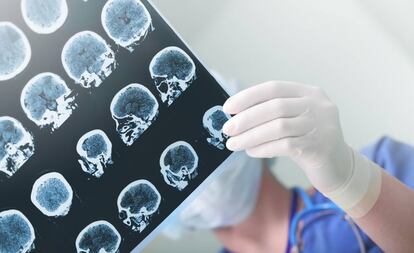What does it feel like to suffer a stroke?
An EL PAÍS journalist recounts what happened on the day of her cerebrovascular accident


Very soon, it will have been five years since I suffered a stroke, a story that has a happy ending. I was 35 years old and did not suffer from any health problems that could have led to a stroke. It was a moderate stroke since it developed little by little: it was not a brain hemorrhage. I got treatment for it very quickly as my partner took me to the hospital right away. One in eight patients who suffer a stroke are between 35 and 55 years old.
Like a hangover
That morning, I showered, and as I was drying off, my boyfriend walked into the bathroom. He spoke to me, I answered him and he just stared, eyes wide open.
– Are you seriously talking like that, or are you joking?
One in eight patients who suffer a stroke is between 35 and 55 years old
He took me to our room. I lay on the bed and I remember thinking ‘I'm dizzy, like I have a hangover.’ The night before, we had watched Ratatouille, a children’s movie about a mouse that dreams of being a chef, and we did not have a single sip of alcohol.
Denying the evidence
My partner took me to the hospital without telling me where we were going, to avoid resistance on my part. So we got into a taxi and he showed the driver a piece of paper on which he had scribbled: “To the hospital.”
In the emergency room, we sat down with a doctor and my partner told him what was happening to me. I protested: “What are you talking about? I feel fine!” I do not know how I said it, but I do remember the doctor’s look of panic. Before I knew it, I was already on a stretcher and a nurse was taking my glasses off. My mind was still clinging to the denial of the obvious. “When they aren’t looking, I’ll hail a taxi and I’ll go to the newsroom,” I thought.
I had been assigned a series of stories about home evictions, and the previous day I had interviewed two children whose families were about to lose their homes. From the stretcher, I fixed my sight on the ceiling as we ran through the hospital at full speed, the idea repeated in a loop in my mind. “Please, I have to write my story!”
A brief improvement and memory loss
I entered the sixth floor of the hospital, into the ICU where I was in the care of a nursing assistant whom I nicknamed, “the panther.” What a strong woman she was. She told me that I had just had a thrombolytic therapy that would cure me. What happened next, I do not remember, but I improved within a couple of hours. I spoke with my parents who were on the AVE high-speed train on their way to Madrid, very concerned after my brother had informed them of what was happening to me. “I feel really good,” I told them.
A disintegrating sensation
It felt “as if the core of my body was disintegrating”
My memory returned at the hands of pain. I was still lying in the intensive care bed and I knew that at any moment the doctors who had been asking me questions were going to return. What is my name? How old am I? What year I was born? And the most difficult: “Repeat this sentence: The scarecrow tried to cross the road at the red light.” The pain was getting stronger and I got into a fetal position to try to stop it. Someone later asked me what I felt at that moment and the description I gave him was that it felt “as if the core of my body was disintegrating.” That's how simple my explanation was.
Awake during surgery
They put me in a room. I knew they were going to operate on me and I breathed a sigh of relief. They did not put me under, although I would have liked them to. They injected me with something I assumed was an anesthetic, but minutes passed and I was still wide awake. If I could have spoken, I would have mentioned it, but at that moment I could not articulate a word (although I did not feel frustrated about it). I had no idea what was happening to me. In that room it occurred to me that it could be something to do with my brain, because I saw that there was a screen in front of me and I remembered the open-skull operations that you sometimes see in movies. I instinctively touched my head. “Phew, it’s closed,” I thought, although I then discovered that my head was fixed to the stretcher with a kind of metal brace.
The operation was long and I did not quite understand what the heck they were doing to me. No one explained it, although my family members were aware of everything. I did not have my glasses on and my myopia did not help clarify things for me. Suddenly, the disintegrating pain returned. I started to complain and tried to take the fetal position again. A nurse scolded me: “Do not move!” The doctor, on the other hand, encouraged me. “You are doing real good.” But what was I doing right?
During the stroke, I lost my visual field and their faces were misshapen, as if someone had eaten the space between their eyebrows
It took me several days to understand it all. A radiologist had performed a catheterization operation on me. The futuristic medical device entered through my groin and went up to my left carotid artery, where three stents, or springs, were inserted to allow my blood flow to return to normal. My artery was now “retreaded,” a doctor from Doctor Egido’s team told me.
After the surgery, the pain subsided. The radiologist and two young doctors stood over me. I tried to look at them but I discovered that they were not humans, but instead beings from another planet. During the stroke, I lost my visual field and their faces were misshapen, as if someone had eaten the space between their eyebrows. “How are you feeling?” the radiologist asked me. I was busy trying to understand what planet they were from. Maybe Uranus? He asked me again and got silence as an answer. One of the young doctors then uttered a phrase that hurt my pride: “Leave her. She’s completely out of it.”
A slight headache
They took me back to the ICU. That night I hardly slept, but I was an attentive observer of everything that went on inside that room, which was a lot, because there were two other people, one of them with complications. At about 4am I finally fell asleep. When I woke up, the only pain I felt was a slight headache that faded throughout the day.
The brain has to learn to do what the damaged part used to do and that takes time
I was in the hospital for seven days in total. It took me weeks to figure out everything that had happened. They did not want to scare me, so they were feeding me the information little by little. When they finally told me that I needed to take some time off, I thought they meant two weeks, but when my mother said it would be a minimum of three months I protested. For my relatives, the hardest thing was not knowing the degree of damage until a few days later. During my stroke, which was caused by a dissection of the carotid artery, I had lost my speech and was slow to recover. On the second day, my communication was reduced to “okay.” After two days, I was able to say to my partner: “Don’t worry.”
The recoveries in some cases are miraculous. The brain has to learn to do what the damaged part used to do, and that takes time. The greatest improvements take place during the first year, but afterwards it continues to evolve (although slowly). I’m lucky to have fully recovered. My partner’s reaction speed was essential. It is very hard for him and my family to think back on those days. But for me, who lived through it all with little awareness of the risk I was facing, it is a positive episode of my life, especially the stage of rehabilitation.
I am infinitely grateful to Dr José Egido, to Dr Ana García, to the neuropsychologist Álvaro Bilbao, of CEADAC, to the speech therapist Elena Panizo and to the occupational therapist Cristina Flórez. They all have a very special place in my heart... and in my brain.
English version by Debora Almeida.
Tu suscripción se está usando en otro dispositivo
¿Quieres añadir otro usuario a tu suscripción?
Si continúas leyendo en este dispositivo, no se podrá leer en el otro.
FlechaTu suscripción se está usando en otro dispositivo y solo puedes acceder a EL PAÍS desde un dispositivo a la vez.
Si quieres compartir tu cuenta, cambia tu suscripción a la modalidad Premium, así podrás añadir otro usuario. Cada uno accederá con su propia cuenta de email, lo que os permitirá personalizar vuestra experiencia en EL PAÍS.
¿Tienes una suscripción de empresa? Accede aquí para contratar más cuentas.
En el caso de no saber quién está usando tu cuenta, te recomendamos cambiar tu contraseña aquí.
Si decides continuar compartiendo tu cuenta, este mensaje se mostrará en tu dispositivo y en el de la otra persona que está usando tu cuenta de forma indefinida, afectando a tu experiencia de lectura. Puedes consultar aquí los términos y condiciones de la suscripción digital.








































